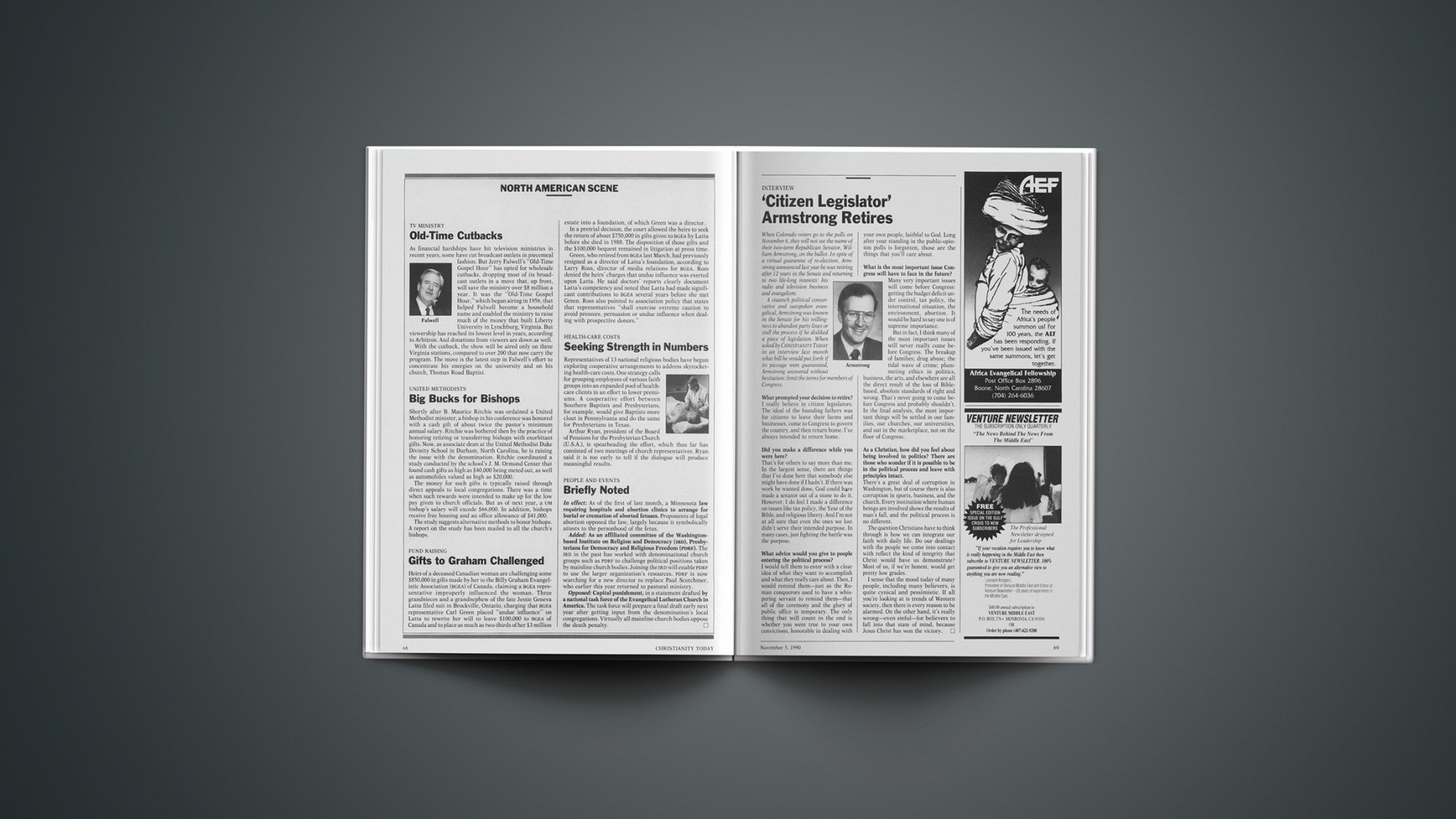TV MINISTRY
Old-Time Cutbacks
As financial hardships have hit television ministries in recent years, some have cut broadcast outlets in piecemeal fashion. But Jerry Falwell’s “Old-Time Gospel Hour” has opted for wholesale cutbacks, dropping most of its broadcast outlets in a move that, up front, will save the ministry over $8 million a year. It was the “Old-Time Gospel Hour,” which began airing in 1956, that helped Falwell become a household name and enabled the ministry to raise much of the money that built Liberty University in Lynchburg, Virginia. But viewership has reached its lowest level in years, according to Arbitron. And donations from viewers are down as well.
With the cutback, the show will be aired only on three Virginia stations, compared to over 200 that now carry the program. The move is the latest step in Falwell’s effort to concentrate his energies on the university and on his church, Thomas Road Baptist.
UNITED METHODISTS
Big Bucks For Bishops
Shortly after B. Maurice Ritchie was ordained a United Methodist minister, a bishop in his conference was honored with a cash gift of about twice the pastor’s minimum annual salary. Ritchie was bothered then by the practice of honoring retiring or transferring bishops with exorbitant gifts. Now, as associate dean at the United Methodist Duke Divinity School in Durham, North Carolina, he is raising the issue with the denomination. Ritchie coordinated a study conducted by the school’s J. M. Ormond Center that found cash gifts as high as $40,000 being meted out, as well as automobiles valued as high as $20,000.
The money for such gifts is typically raised through direct appeals to local congregations. There was a time when such rewards were intended to make up for the low pay given to church officials. But as of next year, a UM bishop’s salary will excede $66,000. In addition, bishops receive free housing and an office allowance of $41,000.
The study suggests alternative methods to honor bishops. A report on the study has been mailed to all the church’s bishops.
FUND RAISING
Gifts To Graham Challenged
Heirs of a deceased Canadian woman are challenging some $850,000 in gifts made by her to the Billy Graham Evangelistic Association (BGEA) of Canada, claiming a BGEA representative improperly influenced the woman. Three grandnieces and a grandnephew of the late Jessie Geneva Latta filed suit in Brockville, Ontario, charging that BGEA representative Carl Green placed “undue influence” on Latta to rewrite her will to leave $100,000 to BGEA of Canada and to place as much as two-thirds of her $3 million estate into a foundation, of which Green was a director.
In a pretrial decision, the court allowed the heirs to seek the return of about $750,000 in gifts given to BGEA by Latta before she died in 1988. The disposition of those gifts and the $100,000 bequest remained in litigation at press time.
Green, who retired from BGEA last March, had previously resigned as a director of Latta’s foundation, according to Larry Ross, director of media relations for BGEA. ROSS denied the heirs’ charges that undue influence was exerted upon Latta. He said doctors’ reports clearly document Latta’s competency and noted that Latta had made significant contributions to BGEA several years before she met Green. Ross also pointed to association policy that states that representatives “shall exercise extreme caution to avoid pressure, persuasion or undue influence when dealing with prospective donors.”
HEALTH-CARE COSTS
Seeking Strength In Numbers
Representatives of 13 national religious bodies have begun exploring cooperative arrangements to address skyrocketing health-care costs. One strategy calls for grouping employees of various faith groups into an expanded pool of health-care clients in an effort to lower premiums. A cooperative effort between Southern Baptists and Presbyterians, for example, would give Baptists more clout in Pennsylvania and do the same for Presbyterians in Texas.
Arthur Ryan, president of the Board of Pensions for the Presbyterian Church (U.S.A.), is spearheading the effort, which thus far has consisted of two meetings of church representatives. Ryan said it is too early to tell if the dialogue will produce meaningful results.
PEOPLE AND EVENTS
Briefly Noted
In effect: As of the first of last month, a Minnesota law requiring hospitals and abortion clinics to arrange for burial or cremation of aborted fetuses. Proponents of legal abortion opposed the law, largely because it symbolically attests to the personhood of the fetus.
Added: As an affiliated committee of the Washington-based Institute on Religion and Democracy (IRD), Presbyterians for Democracy and Religious Freedom (PDRF). The IRD in the past has worked with denominational church groups such as PDRF to challenge political positions taken by mainline church bodies. Joining the IRD will enable PDRF to use the larger organization’s resources. PDRF is now searching for a new director to replace Paul Scotchmer, who earlier this year returned to pastoral ministry.
Opposed: Capital punishment, in a statement drafted by a national task force of the Evangelical Lutheran Church in America. The task force will prepare a final draft early next year after getting input from the denomination’s local congregations. Virtually all mainline church bodies oppose the death penalty.










